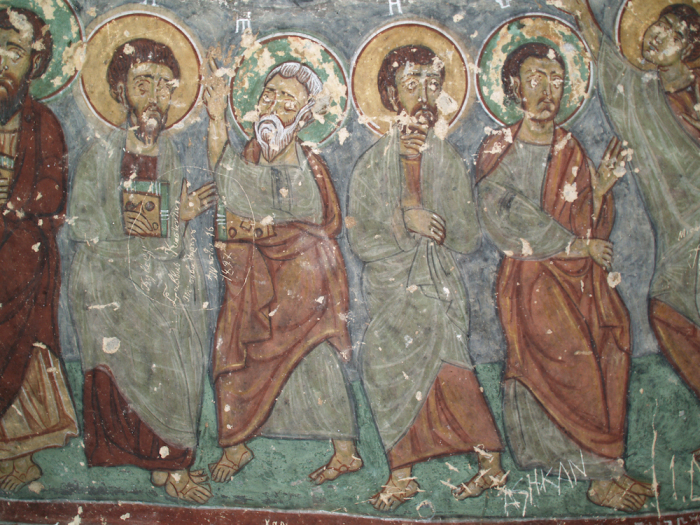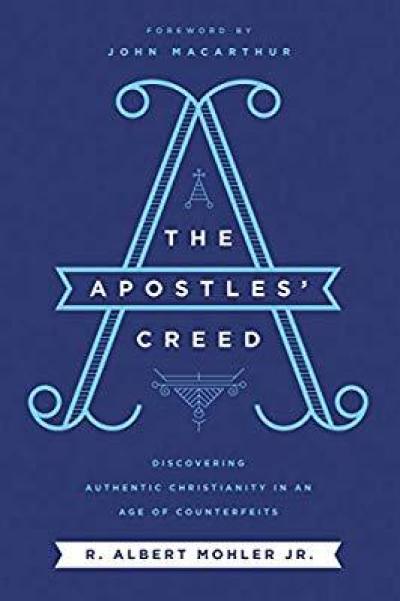Al Mohler: True Christians believe every word of the Apostles' Creed (exclusive)

In a society in which counterfeit gospels, false doctrines, and diluted theology are becoming rampant, Albert Mohler Jr. is calling on the Church to define Christianity in its historical biblical terms for true spiritual fulfillment.
In his new book, The Apostles' Creed: Discovering Authentic Christianity in an Age of Counterfeits, Mohler, president of The Southern Baptist Theological Seminary in Louisville, Kentucky, argues that the Apostles' Creed, although written nearly 2,000 years ago, remains a powerful summary of the Christian faith as revealed in the Bible for the 21st century Church.
“We live in a day where there’s ‘spirituality,’ but not Christianity,” Mohler told The Christian Post. “That’s not a category found in Scripture. There’s no Christianity that isn’t doctrinal Christianity. Christianity is based on events that took place in space and time in history. It’s a faith of definite, essential beliefs. The Apostles' Creed is a way of summarizing the Christian faith so that Christians can be grounded in the truth and be able to detect false doctrine and false Christianity.”
The oldest known creed in Christendom, the Apostles' Creed is a faithful summary of what Christians believe and holds an unparalleled level of doctrinal authority, beginning with the statement, “I believe in God.” Those simple words, Mohler said, contain the basis of the entire Christian faith.
“You have so many people who say, ‘I have belief’ or ‘I have a faith,’ but according to Scripture, these people are only Christians if the focus and foundation of that belief is Christ. We don’t believe we’re saved by faith; we believe we’re saved by faith in Christ,” he said.

“There are many people who know accurate truths concerning Christ, but they aren’t trusting Christ, they aren’t placing their faith and confidence in Christ. They don’t believe in Christ as a Savior who died on the cross for their sins and was raised by the power of God. True Christianity is a personal belief — and those words go back to the Apostles believing Jesus’ declaration, ‘I am the Way, the Truth, and the Life.’”
Mohler acknowledged that some churches disregard the Apostles' Creed, instead adopting the slogan “No creed but the Bible.” He told CP that while he understands the impulse behind that statement, it was often used by liberal church leaders to deny the essential truths of the Gospel.
“Jesus gave His disciples the ability to maintain that faith which was first of all delivered to the saints,” he explained. “We have to summarize what the Bible teaches, to determine whether or not someone is teaching the whole truth. Paul wrote to Timothy that one of his main responsibilities was to maintain the pattern of sound words. This is an essential responsibility of the Church. We have to know the essential doctrines that will mark real Christianity wherever it’s found.”
In his book, Mohler addresses common misunderstandings regarding the Apostles' Creed, such as the line that states, “I believe in ... the holy catholic church."
“The Creed declares a belief in the ‘holy catholic church,’ but the word ‘catholic’ is not the name of a religious body, but rather a definition of the Church; Jesus said His Church was ‘catholic,’ meaning over all people, over all places, over space and time,” he said. “It speaks to the singularity of the Church, and there’s not another word that fits there. The affirmation ‘I believe in the holy catholic church’ is the belief that Christ died for His Church and it is united to Him in the sense that the Church includes those who, at any place and at any time, come to saving faith.”
“Protestants,” he added, “should not concede the word ‘catholic’ to the Catholic Church. It’s an important word for Protestants to embrace.”
Another stumbling block for some evangelicals is the line in the Apostles’ Creed that talks about Jesus ‘descending into Hell.’ The theologian explained that the Creed is not referring to Hell as a place of everlasting punishment, but rather the state of being dead.
“Unfortunately, the medieval church used a lot of imagination on this issue, which is not helpful to our modern reading of the Creed,” he said. “Jesus did not go to the place of everlasting torment, but He did die. That line is referring to the biblical simplicity that Jesus was crucified, He genuinely died, and He joined the dead, and was then raised on the third day."
Ultimately, it’s important for Christians to understand that there are “limitations on substitute language” when it comes to the Apostles' Creed, Mohler said. He pointed out that the original words of the Creed also hold significant historical weight, as they were often the final recitation of Christian martyrs in the earliest days of the Church and were confessed by the Puritans and Protestant Reformers.
“There’s tremendous value in saying the very words martyrs, Puritans, and Reformers spoke,” he said. “There are certain words that would lose a great deal if they were updated too much. You can think of this with the preamble to the Constitution or Declaration of Independence. There’s a limitation to how modernized you can make some statements without losing too much meaning.”
The Apostles' Creed: Discovering Authentic Christianity in an Age of Counterfeits is the third and final installment in Mohler’s series of works about three central documents in Christian faith and practice. His previous books addressed the Ten Commandments (2009’s Words from the Fire), and The Lord’s Prayer (2018’s The Prayer that Turns the World Upside-Down).
Mohler explained that throughout Christian history, those three texts — the Lord’s Prayer, the Ten Commandments, and the Apostles' Creed — have been used by the Church in the worship and teaching of new believers.
“One of my goals early in ministry was to write an exposition of these three texts for the Church,” he said. “Throughout history, all of these texts have been incorporated into Christian worship. There’s something powerful about Christians standing together, saying ‘I believe’ in unison, praying as instructed in the Lord’s Prayer, and reciting the Ten Commandments. It’s not a coincidence that every Christian church has found its way to those three things.”
The Apostles’ Creed, Mohler said, can build true Christian unity on the foundations and the fundamentals of the faith. All Christians across denominational lines, he asserted, can believe more than the Apostles' Creed — but no Christian can believe less.
“That’s crucial because every church has holes and teaches doctrines that are beyond the Apostles' Creed,” he explained. “The Creed doesn’t tell us how or whom to baptize, it doesn’t tell us the order of the church, it doesn’t speak to many of those things. But a Christian church believes every word of the Apostles' Creed. If it believes less than the Creed, it's not a true Christian church."
"If the church doesn’t know the truth, it can’t function as Christ assigned it to function," he emphasized.
Although an ancient statement, the Apostles' Creed is a faithful explanation of the Gospel and has the power to equip coming generations to remain doctrinally and theologically faithful in an increasingly post-Christian culture, Mohler said.
“We need to teach these truths to our children and to new believers,” he said. “My great hope is to introduce many Christians to the Apostles' Creed, maybe for the first time, and to help them understand the richness of the orthodox, biblical, classical Christian faith as rooted in Scripture and as founded by Christ.
"I hope to give Christians ammunition against false doctrines and help them to detect false Christianity.”



























